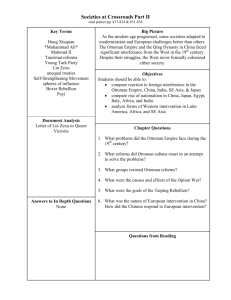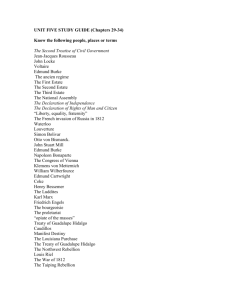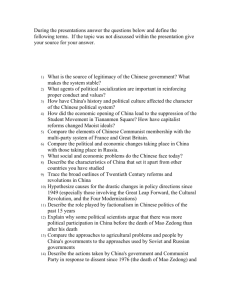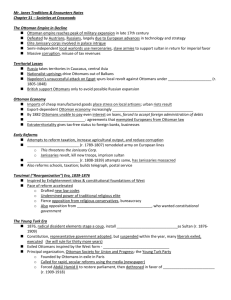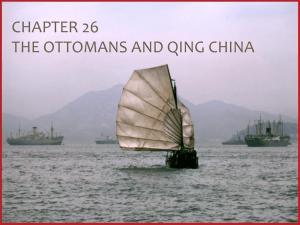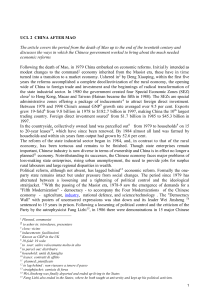Chapter 32
advertisement
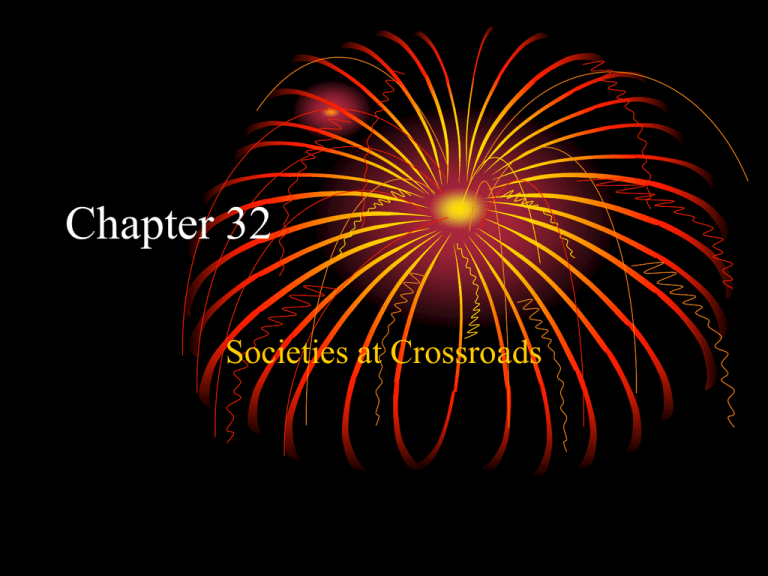
Chapter 32 Societies at Crossroads Ottoman Problems • Egypt revolt against Ottomans under Muhammad Ali (r. 1805-1848) • Most significant loss to Ottomans due to need of intervention by British • Go in debt • By 1882 Ottomans unable to pay even interest on loans, forced to accept foreign administration of debts • Capitulations: agreements that exempted Europeans from Ottoman law • Extraterritoriality gives tax-free status to foreign banks, businesses Early Reforms • Attempts to reform taxation, increase agricultural output, and reduce corruption • Sultan Selim III (r. 1789-1807) Janissaries revolt and imprison Sultan • Sultan Mahmud II (r. 1808-1839) has Janissaries massacred • Also reforms schools, taxation, builds telegraph, postal service Tanzimat (“Reorganization”) Era, 1839-1876 • • • • • Begun by Mahmud II Drafted new penal and commercial codes, backed education Undermined power of traditional religious elite by supporting equatlity Fierce opposition from religious conservatives, bureaucracy Opposition from radical Young Ottomans, who wanted constitutional government The Young Turk Era • 1876 radical dissident elements stage a coup, install Abdül Hamid II as Sultan (r. 1876-1909) • Constitution, representative government adopted, but suspended within the year, Many liberals exiled, executed • Ottoman Society for Union and Progress: The Young Turk Party • Called for rapid, secular reforms • Forced Abdül Hamid II to restore parliament, then dethroned him in favor of Mehmed V Rashid (r. 1909-1918) Young Turk Rule • Attempted to establish Turkish hegemony over far-flung empire • Turkish made official language, despite large numbers of Arabic and Slavic language speakers • Yet could not contain forces of decline The Russian Empire in Decline • Russia a massive, multi-cultural empire • Only approximately half speak Russian, observe Russian Orthodox Christianity • Romanov Tsars rule autocratic empire • Powerful class of nobles exempt from taxation, military duty • Exploitative serfdom The Crimean War, 1853-1856 • Russian expansion into Caucasus in larger attempt to establish control over weakening Ottoman empire • Threatens to upset balance of power, Europeans become involved • Russia driven back from Crimea in humiliating defeat • Demonstration of Russian weakness in the face of western technology, strategy • Calls for reform Reform: Emancipation of the Serfs • Serfdom source of rural instability and peasant revolt • Tsar Alexander II emancipates serfs in 1861, without alleviating poverty, land hunger • Forced to pay for lands they had farmed for generations • Limited attempts to reform administration, small-scale representative government • Network of elected district assemblies called zemstvos Industrialization in Russia • Count Sergei Witte, minister of finance 1892-1903 pushed for industrialization • Massive railroad construction • Trans-Siberian railroad • But massive industrial discontent • Peasants uprooted from rural lifestyle to work for low wages, long hours Radicalization • 1881 radical Land and Freedom/People’s Will movement assassinates Tsar Alexander II • Nicholas II (r. 1894-1917) enters into war with Japan (1904-1905) • Humiliating defeat exposes government weaknesses • Social discontent boils over in Revolution of 1905-Bloody Sunday forces creation of Duma. • Strikes force government to make concessions The Opium Trade • • • • Illegal, but poor enforcement Increasing trade and social ills evident by late 1830s Chinese move to enforce ban British agents engage in military retaliation: the Opium War (1839-1842) • British naval forces easily defeats Chinese • China forced into treaty • Hong Kong ceded to British in Treaty of Nanjing (1842), ports opened to British traders • Extraterritorial status to British subject The Taiping Rebellion (18501864) • Large-scale rebellions in later nineteenth century reflect poverty, discontent of Chinese peasantry • Population rises 50% between 1800-1900, but land under cultivation remains same • Nian Rebellion (1851-1868), Muslim Rebellion (18551873), Tungan Rebellion (1862-1878) • Taiping Rebellion led by Hong Xiuquan, schoolteacher, called for destruction of Qing dynasty. • Rebellion will be defeated by vastly superior army with European weapons. Taiping Platform • • • • Abolition of private property Creation of communal wealth Prohibition of footbinding, concubines Free public education, simplification of written Chinese, mass literacy • Prohibition of sexual relations among followers (including married couples) • Yet leaders maintained harems The Self-Strengthening Movement (1860-1895) • High point in 1860s-1870s • Slogan “Chinese learning at the base, Western learning for use” • Blend of Chinese cultural traditions with European industrial technology • Change to Chinese economy and society superficial Spheres of Influence • Qing dynasty loses influence in south-east Asia, losing tributary states to Europeans and Japanese • Vietnam: France, 1886 • Burma: Great Britain, 1885 • Korea, Taiwan, Liaodong Peninsula: Japan, 1895 • China itself divided into spheres of influence, 1895 Hundred Days Reforms (1898) • Kang Youwei (1858-1927) and Liang Qichao (1873-1929) • Interpreted Confucianism to allow for radical changes to system • Pro-industrialization • Emperor Guangxu attempts to implement reforms • Empress Dowager Cixi nullifies reforms, imprisons emperor The Boxer Rebellion • Cixi supports Society of Righteous and Harmonious Fists (“Boxers”), anti-foreign militia units • 1899 fight to rid China of “foreign devils” • Misled to believe European weapons would not harm them, 140,000 Boxers besiege European embassies in 1900 • Crushed by coalition of European forces • China forced to accept stationing of foreign troops Death of the Dowager Empress • • • • • Emperor dies a mysterious, sudden death Cixi dies one day later, November 1908 2-year old Puyi placed on the throne Revolution in 1911 Puyi abdicates, 1912 Transformation of Japan • Japanese society in turmoil in early 19th century • Poor agricultural output, famines, high taxes • Daimyo, samurai classes decline, peasants starve • Tokugawa government attempts reforms, 1841-1843 • Cancelled daimyo, samurai debts • Abolished merchant guilds • Compelled peasants to return to cultivating rice • Reforms ineffective Foreign Pressure • Europeans, Americans attempting to establish relations • U.S. in particular look for Pacific ports for whalers, merchants • Japan only allowed Dutch presence in Nagasaki • 1853 Matthew Perry sails gunship up to Edo (Tokyo), forces Japanese to open port • Sparks conservative Japanese reaction against Shogun, rally around Emperor in Kyoto The Meiji Restoration (1868) • Brief civil war between imperial and Tokugawa forces • 1868 Emperor Mutusuhito (Meiji, 18521912) takes power • Goals of prosperity and strength: “rich country, strong army” • Resolved to learn western technology
